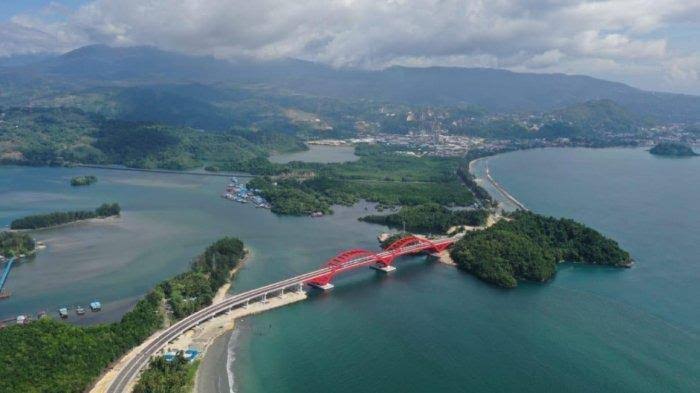Government Continues to be Committed to Realizing Equitable Development in Papua
By: Loa Murib )*
Equal development in Papua continues to be one of the main priorities of the Indonesian government. This commitment is reflected in various policies and concrete steps taken during the administration of President Joko Widodo (Jokowi). Development in this region is not only about infrastructure, but also about improving the welfare of the Papuan people as a whole, especially in areas that have been left behind.
President Jokowi firmly stated that development in Papua must continue to be monitored by security forces, such as the TNI and Polri. This instruction is not without reason, considering the security conditions in several areas of Papua that are still prone to conflict. Areas such as Nduga and Wamena, for example, are often the location of clashes between armed groups and security forces. Therefore, tight monitoring by the TNI and Polri in every development activity is considered an important step to ensure smooth development and the safety of workers in the field.
In a statement delivered at the Merdeka Palace, President Jokowi emphasized the importance of tight security, both for road infrastructure, bridges, and logistics transport vehicles. This is a preventive measure so that hostage incidents such as those experienced by Susi Air pilot Phillip Mark Mehrtens do not happen again. The incident reminds us of the complexity of the security conditions in Papua which require special attention so that the development process is not disrupted.
Development in Papua has been a national priority since the beginning of President Jokowi’s administration. In the past 10 years, the government has continued to increase budget allocation and prioritize Papua in every national development agenda. This has been recognized by various parties, including the Indonesian House of Representatives. Member of Commission IV of the Indonesian House of Representatives, Sulaeman L. Hamzah, emphasized that Papua’s development has been the main focus for the past decade.
This government step is not only limited to the development of physical infrastructure, but is also directed at improving the welfare of the Papuan people. One of the policies that is an important milestone is Presidential Instruction (Inpres) Number 9 of 2020 concerning the Acceleration of Welfare Development in the Provinces of Papua and West Papua. This policy is expected to provide a greater positive impact on the community, especially in accelerating the increase in the Human Development Index (HDI) in Papua.
Sulaeman stated that the welfare of indigenous Papuans must remain the government’s main focus, both now and in the future. The government continues to strengthen synergy between ministries and institutions to ensure that the programs designed are able to create jobs and improve the quality of education in Papua. This is an important step to optimize the potential of Papua’s abundant natural resources and empower local communities.
Tight security by security forces is not only about maintaining worker safety, but also an effort to create stability in areas that are often hit by conflict. Conditions in Papua, which are often influenced by the Free Papua Movement (OPM), require the government to be careful in carrying out development. In some areas, the threat from separatist groups is still real, and the government cannot turn a blind eye to potential security disturbances.
The hostage case of Phillip Mark Mehrtens is one example of how vulnerable the situation in Papua is. Although he was finally rescued after being held hostage for 1.5 years, this incident is a reminder of the importance of a more systematic security approach. The government, through the Cartenz Peace Operation Task Force, prioritizes a soft approach in handling this case. Dialogue and mediation efforts are prioritized to save the hostages without triggering wider violence.
President Jokowi emphasized that every development process, including logistics transportation, must be closely monitored by the TNI and Polri. This is expected to prevent potential disruption from groups trying to hinder development in Papua. Thus, the infrastructure development process can run smoothly and local communities can immediately feel the benefits of the programs initiated by the government.
The government’s commitment to developing Papua has also received appreciation from the international community. In a dialogue with Australian media, SBS and Voice Indonesia, the Coordinating Ministry for Political, Legal and Security Affairs (Kemenko Polhukam) reaffirmed Indonesia’s commitment to accelerating development in Papua. Deputy for Domestic Coordination of Kemenko Polhukam, Major General TNI Heri Wiranto, emphasized that Papua will continue to be a priority in the national development agenda.
This government step has not only had an impact on physical infrastructure, but also on improving people’s welfare. This dialogue with international media has also become a platform to clarify issues that are often misunderstood by the outside world, such as press freedom in Papua. The Indonesian government emphasized that there are no restrictions for foreign media to cover Papua, as long as they follow the applicable rules.
The government has demonstrated its commitment to developing Papua evenly. Despite the many challenges faced, including security and difficult geographical conditions, the government’s efforts so far are commendable. President Jokowi and stakeholders continue to strive to ensure that development in Papua not only produces physical infrastructure, but also improves the quality of life of the Papuan people.
In the future, it is hoped that the next government can continue the programs that have been pioneered. Development in Papua is not only about fulfilling political promises, but also about realizing social justice for all Indonesian people. Papua, with all its natural potential, has a great opportunity to grow into a prosperous and highly competitive region in the future.
)* The author is a Papuan student in Surabaya
